I talked (complained) about it endlessly before leaving for Uganda. My parents worried about it (“don’t join any protests, honey!”), my friends joked about it (one gave me a copy of our college newspaper with the headline crossed out and replaced with “Student Arrested in Ugandan Gay Bust”) and I, upon arriving in Uganda for a five-plus months stay, tip-toed nervously around it for at least a few weeks.
I’m gay. And Uganda has some… troubles. With gay people.
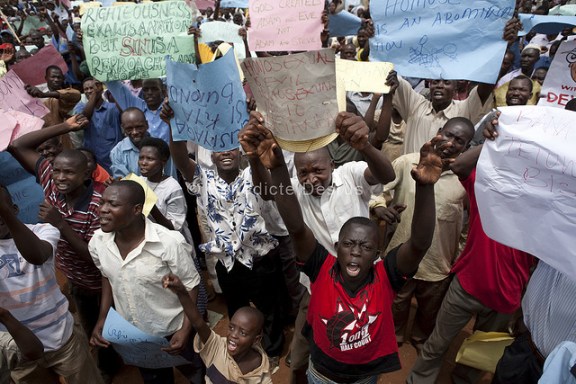
Maybe you’ve heard about the bill currently in Ugandan parliament that not only outlaws homosexuality, but includes the death sentence for “aggravated” homosexuality, whatever that means? Also, the definition of homosexuality here includes anyone who “touches another person with the intention of committing the act of homosexuality.” So no flirting, y’all! (I broke this law last night though honestly it was more “hope” than “intention”)
But I’m not here to talk about things like, “if I come out to my director, she could be imprisoned for three years.” You can find that on the internet and in the actual text of the bill here.
I’m here to reflect on what I’ve seen and experienced in the two months I’ve spent here so far, as an American woman of color studying abroad in Kampala, Uganda.
+
The Brand New Closet
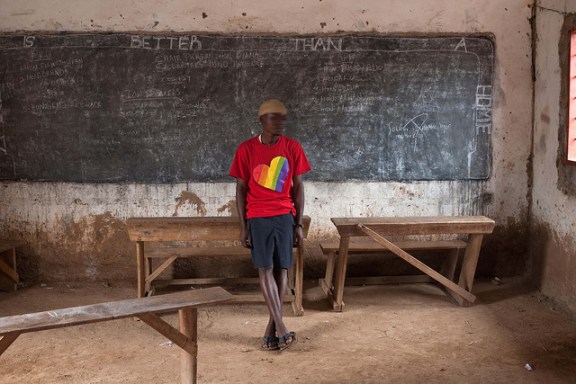
For the first week I was even hesitant to come out to the other American students in my program and what surprised me the most was how hard it was. I don’t think of my identity all tied up in my sexuality and I still don’t, but keeping quiet about it made me realize just how much a part of my life my queer identity is. I don’t really think I’ve ever gone through a part of my life in the closet. I generally told people as I became more comfortable and figured out things about myself. There was never a time where I may have wanted to tell someone, but felt compelled by some outside force to keep quiet. But now there was.
Should I implicitly lie, using gender-neutral pronouns when I tell back-home stories, or should I just not tell stories? I’ve always enjoyed talking about experiences truthfully and explicitly, and suppressing that wasn’t easy.
I started out by dropping some female pronouns while talking to a girl who I thought was kinda cute, just to see her reaction. Later that night, we were playing “Never Have I Ever” and she busted out with “Never have I ever had sex with someone of the same sex.” She said this while looking at me and laughing. [Note: she said this completely un-maliciously, and probably because there is literally nothing else she hasn’t done.]
“But you’re been a threesome!” I said while putting a finger down.
She shrugged, “It was pretty centered around the boy.” Okay? But I was out and also drunk, telling my stories with relish while asking the group to not let me get so drunk that I start hitting on women.
Overall, a productive night.
+
Don’t Ask Don’t Tell
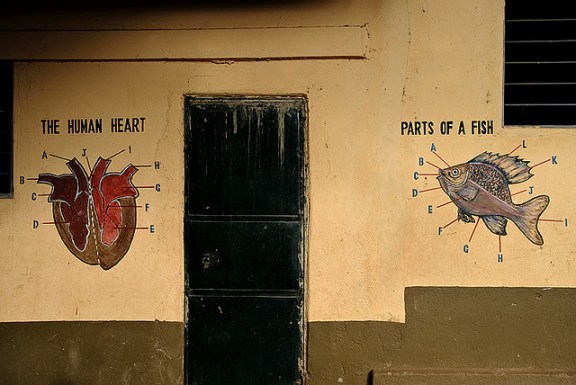
In the first week of the program, my director addressed the topic during orientation, briefly– very briefly.
She said: If you’re gay, don’t tell any Ugandans, not even your family. The program directors are the only ones you can talk to about this. If homosexuality comes up in conversation, try to remain neutral, don’t reveal your opinions. David Kato was murdered by someone trying to rob him, the fact that he was gay [he was not only gay, but the most vocal gay rights activist in Uganda] has nothing to do with his murder. And that was it. That was the talk. I made eye contact with the other queer girl across the table. Uh-oh.
+
Home & Away
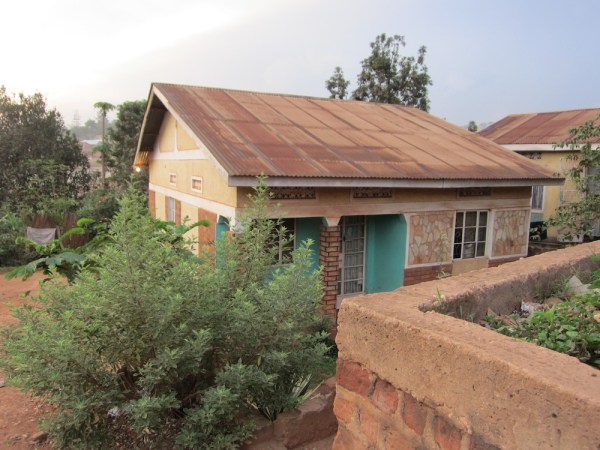
Many people had conversations about queerness within the first night of their homestay. One girl had to listen to her family talk about how wrong homosexuality is while Ellen played on their TV. Richard Simmons was the guest.
This girl’s sister watches The L Word.
THE L WORD.
“It’s a good show.”
Say whaaaaaatttt????
Most of my homestay and my general interactions with other Ugandans were uneventful. I had to take a photo of my cousin and I in a cross-dressing fashion show when I was about five and he was nine and looking at it in the states, I thought it was funny and cute. When my host family here saw it, I was slightly mortified and quickly turned the page. I eventually took out the photo.
But how would I make it through an entire semester without talking about queer stuff?
Because also: it was a conversation I wanted to have, eventually.
+
Only God Has That Power
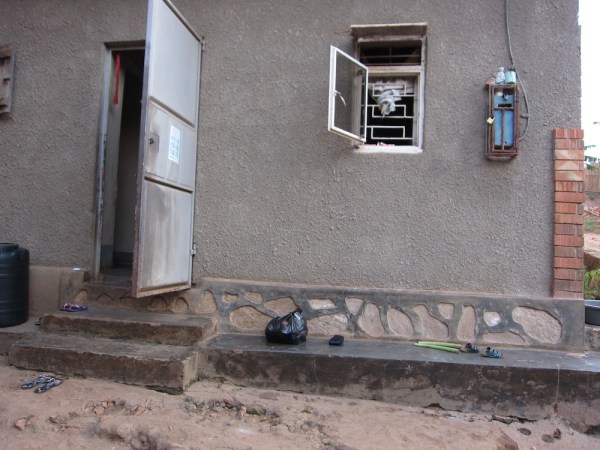
The first conversation about homosexuality happened with my brother, Chris. We were sharing a small bottle of waraji (millet gin, not recommended) on the back stoop when he started talking about a guy who’d friend requested him and then said some “inappropriate things” that caused my brother to consequently block him.
The way he shook his head, implying that the details were too appalling to share — “And, uh, I had to block him.”
“So, what do you think of the bill?” I asked.
It was time.
Chris explained that homosexuality wasn’t natural and it was against God. “But it’s not natural for men to kill other men too,” he said. “Only God has that power. To decide who will live and who dies.” He shrugged, “but you let them, those who committed homosexuality, out of jail, and then they do it again.”
I wanted to say “DUH” but instead I didn’t. The linguistics of the phrase ‘committed homosexuality’ implies that it was a one time act, a mistake.
Oops! I just committed homosexuality again!
Let’s be honest, someone is gay. Someone is a lesbian. Someone is queer. IS. It is a state of being. A part of someone. Not some act they just accidentally do one day, especially not here.
But that’s just how everyone here thinks, and I’m not here to bash anyone’s beliefs. I love my family. I respect them and they respect me. My mother here is an amazing strong woman who supports her whole family on self-created enterprises. They’re not ignorant. But homophobia is just the norm here and you can’t ever blame the individual for a systemic issue. Chris told me that if the bill went up for referendum, it would have passed.
+
+
I’m One Of You
I’ve seen some queer women here, I’ve seen some butch-looking girls maybe three times in two months and I want to run up to them and say, “I’m one of you! I’m one of you!” Or maybe not that. Maybe I could just start a conversation with them and know that they understood.
Then one night at a club I saw this cute girl and she seemed queer. Just how she danced with her friends and how uninterested she was in the guys there. We made eye contact and I went to dance with her and her friends for a while and I got their numbers.
I thought about texting her the next morning but what was the point, really? We could hang out a lot and have sex, but what then? I’d leave for the US in July and she’d still be in Uganda. What if I bring out her inner queer and am I overestimating myself to worry that I had the potential to ruin this girl’s life? Yes. But with so much on the line, what could I think?
+
+
New Ideas

This Peace Corps volunteer who’d spent over a year here told me that it’s just more like being gay isn’t talked about here. It’s a completely new idea and people tend to reject the unknown.
That response seemed like a cop-out.
+
+
Carry Me
We were driving somewhere and my friend was arguing in favor of using surrogate mothers in order to equalize the workplace. Pregnancy leave, she explained, was the last remaining legitimate excuse for men to get promoted instead of women. She was very well-articulated. If surrogate mothers became normalized for ambitious women then they’d remove the final excuse. Furthermore, it would place the parenting responsibilities more equally between the mother and the father.
I imagine I’ll want to carry my own (theoretical) children when the time comes but I could see her point. But everyone else was totally disgusted! Really, I’d never seen a consensus quite like this amongst my group. It’s just wrong! they said, to pay someone to carry your child for you. WRONG!
Don’t you see the parallel between the way you’re reacting right now and what the Peace Corps guy said?, I asked. Nope, they didn’t. I know homosexuality and surrogate pregnancy are nothing alike but I thought the analogy worked. Everyone was mad at me for implying they were closed-minded.
+
+
I Wanna Hold Your Hand
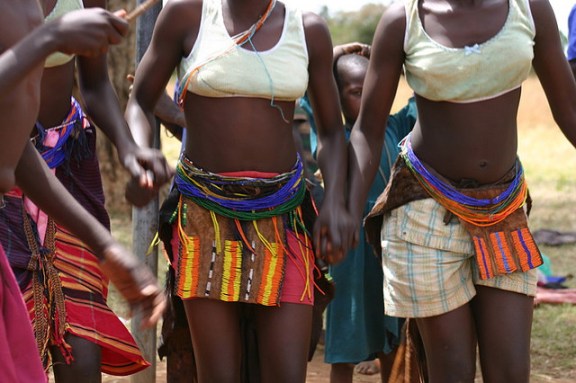
Homosexuality practically doesn’t exist in the Ugandan mind. They’re always surprised when I mention having heaps of queer friends back home. This absence actually allows for MORE freedom in how people of the same sex express fondness for each other. Men hold hands crossing the street. My mother has no problem affectionately touching my lower back or ass. Maybe men are more willing to hold their friends’ hand when nobody ever supposes homosexuality. But men hold hands in India, too. So maybe there’s some cultural reason I’m totally blind to.
+
+
Night Dancers
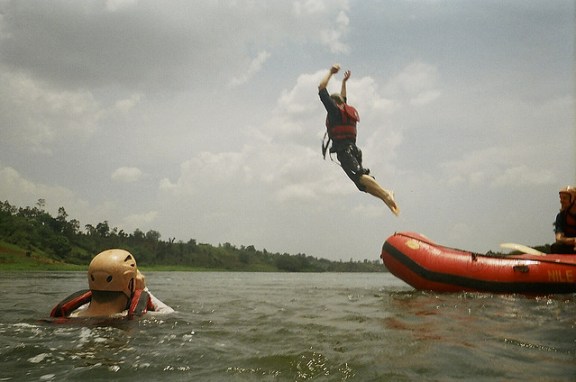
I met one moderate Ugandan! I found him at a rafting company. He explained that he believes what people want to do, they can do. The (white) owner of the company was gay and more-or-less out.
The problem, the guide said, was how the international community handled news of the bill. It conflicted with Uganda’s autonomy. Uganda was dependent on these countries for funding, the relationship there was tricky. Because if Uganda was rich, they could do whatever they wanted. They could make everyone believe in Night Dancers!
Night dancers are a terrifying idea. They are people, drugged up on something, who dig up graves and eat the corpses. If you catch one, they’ll kill you to protect themselves. Everyone here believes in them, and if you talk about them long enough with your friends (especially friends who are so well versed in drug culture, they have stories about what drugs the night dancers may be using), walking home becomes effing scary.
+
+
Colonialism
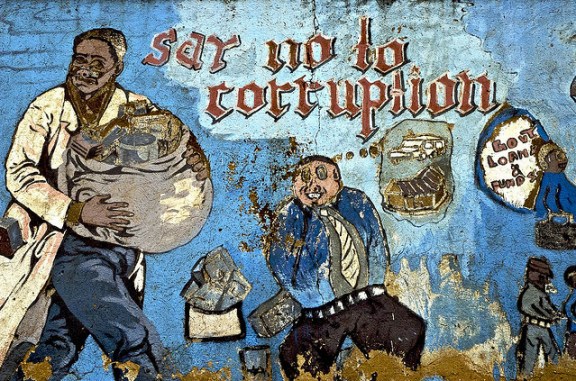
What the raft guide said made sense, sorta. But at what point do the rights of the individual come before the majority consensus? In this case, I firmly believe the rights of the individual wins.
Then if you consider the history of colonialism (that thing where more powerful nations imposed their will upon East African countries), it gets even more twisted. Can other states take advantage of these historical power differentials to do something (which I believe is) right?
Obviously I don’t support this bill, but I face some moral questions about my role here, as someone who opposes the majority.
+
+
Leaving
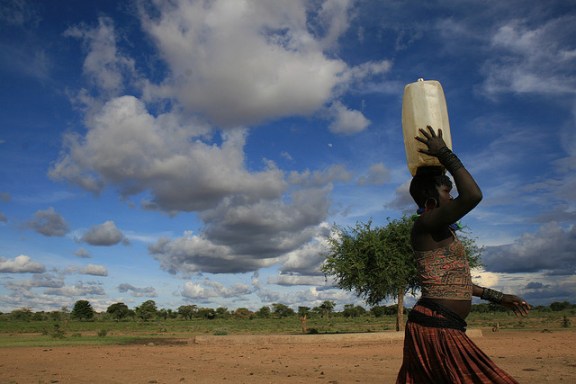
This account comes off as relatively positive, or at least neutral, so I want to emphasize that it reflects my personal experiences here. I do not know what it is like to be born here, to live here permanently.
I may be sane only because I know I am leaving. I also, as I assume most do, want to have a good experience studying abroad, so I am more likely to reflect on my experiences in that light. I only have one more month here before I transition from student to tourist, and already the group is getting sentimental. When studying abroad or traveling, even the worst experiences become just that; experiences. Something to look back on and tell your friends about while gesticulating wildly to enhance the story. This disclaimer is important, because there has to be a queer community here, even if I haven’t been able to find it, and their story would be much different.








Comments
This is interesting. I love it!
I totally agree
http://gurlgoestoafrica.tumblr.com/
That has to be the best tumblr I have come across today, thank you XD
This pretty much made my week.
This was wonderful, thank you.
I love hearing about other cultures and I appreciated the attempt to explain where the population gets their views from. I’d love to read an update on the rest of your time there.
Thanks for writing this and be careful. As I was reading your article it occurred to me that, “Gee, Ugandans can use the internet too, speak English too, and I hope no angry person recognizes the photo of your host family’s home and tracks you down!!” Take care of yourself, girl! This is serious business.
I appreciate this so much. I’m in a similar closeted cross-cultural situation, and some days the only way I can think of to process any of it is to buy a ticket home – the leaving thing. But even that isn’t really comforting. It’s a disturbing reminder of the privilege that my relative wealth and my citizenship affords. I relinquished my rights by choice and I can reclaim them whenever I give up my (misguided?) idealism.
I cannot begin to imagine what it’s like to be a queer African woman stuck in a suffocatingly heteronormative culture. Is there any rung lower on the socioeconomic ladder of the world? Africa is incredibly diverse, and I can only speak from my own experience. In my country, their silence is their voice. Their silence says it all.
hey ! i encourage you ! most of us its the same way but there is always a way out.
This article’s awesome, thanks for writing it! It’s really cool to have this perspective on the matter.
This is a fantastic article! Such an interesting topic! It makes me feel so priviliged to have been born in the western world, even if we don’t yet have equal rights … at least we have SOME rights!!!
Please be careful out there!
This is really cool. A (visibly) lesbian friend of mine spent some time in Uganda. I remember looking through he facebook photos, seeing a picture of her on the back of a motorcycle labeled “fleeing Uganda in the dead of night” and chuckling to myself before I realized the implication there.
On a personal level, I also have a difficult time reconciling my very pro queer rights values with anti-colonialism. I tend to believe, same as with my feminism, that people need to liberate themselves their own way, and I’ll lend help where I’m asked, but it’s not right and counterproductive to stomp my Canadian feet around someone else’s culture. In other words, the people on the ground need to empowered and their experiences centred, not outsiders dictating from on high. Of course, in Uganda’s situation where people can be arrested and die for speaking out, I don’t even know if it’s feasible… Gah, social justice is difficult
I’ve had the same internal conflict as you have re: pro-queer rights and anti-colonialism and have come to basically the same conclusion. Why is life so complicated! Jeez.
But then you look at the links between the bill and The Family and really… there’s colonialism all up in there. It’s awful. :/
In all likelihood there *are* people working and speaking out about it and have been for ages (David Kato anybody?), we just don’t hear about them because they don’t happen to be white Western privileged folk coming in to rescue the poor ol’ brownies.
very interesting. thank you so much! :)
Wow, that was really very interesting. Thanks for posting this – and yes, as others have said, please stay careful! You seem to be going about things in a very considerate matter as it is anyway :)
Interesting what you said about same-sex hand holding, showing affection etc, I spent a term abroad studying in China last year, and noticed the same sort of thing – Chinese guys holding hands with guys and girls hugging, walking around with their arms around each other. I came to the same conclusion as you, putting it down to the absence of homosexuality in mainstream culture. Whatever the reason, it worked out pretty well for me when my gf came to visit and we were able to walk around holding hands without attracting any stares.
This is very interesting, thanks for posting! I think that Uganda is getting some terrible press recently, so in order to balance it out I highly recommend this movie-> http://www.youtube.com/watch?v=LIl-zFPD3gc it’s called War Dance and it’s the best documentary ive ever seen and it helps somewhat to inform the rest of us what it’s like to grow up in Uganda, and it’s available to watch online, just type in “watch War Dance” and that should work! I know im digressing but it’s slightly relevant! :-)
I lived in Uganda from when I was 8 till I was 11. It was there that I first learned what a lesbian was because someone threw the word at me as an insult. It was odd though, we had regular cross-dressing days during spirit week at school.
Back then, I don’t remember anyone talking to me about homosexuality, so whenever I hear about the homophobia in Uganda, I wonder if it’s actually getting worse, rather than better? It’s becoming part of the national identity and as Uganda works to distance itself from outside forces (namely, the liberal homosexy loving west) it constructs these ideas about its own moral superiority.
What puzzles me is that a country with a history of genocide and discrimination could suggest the death penalty for homosexuality. It’s all very sad.
This is a really interesting point — that the fires of homophobia might be being fanned as a sort of sign of national unity/pride, to solidify a group identity. Which, of course, is probably not so different from a lot of what’s gone on in right wing politics here in the U.S., with tea partiers and their ilk whipping up hatred for something that most likely would’ve just gone ignored in many households otherwise.
I REALLY LIKE THIS
This was a very interesting article, thanks for writing it.
Thankyou for this.
Wow. Thanks for writing this. I had followed the Uganda law in the New York Times but you really bring everything to life and your writing is absolutely riveting. You are an extraordinary girl. Truly wonderful article.
wow, i really enjoyed reading this. write more please?
Thanks for sharing your experience. It’s really interesting.
This was probably a throwaway line to you but it stuck out to me – what does two men holding hands in India have to do with anything?
I feel like there’s some level of projecting American ideas about homosexuality onto Ugandans and that “all Ugandans believe homosexuality is against God” is probably something of an oversimplification. Would it be possible to get an account from a Ugandan (likely anonymous) on how homosexuality is framed in their culture?
For a gay Ugandan’s view of being gay in Uganda, try this blog http://gayuganda.blogspot.com/
thanks for sharing. this is very interesting and insightful to get to learn about other culture. hope you have fun for the rest of your stay
Thanks for this! It’s interesting to see one individual’s perspective on such a complicated issue.
You’re a braver woman than I am, I’ll tell you that. I can’t even bring myself to come out to family members that I know will disown me just because I know there’s a *possibility* they’ll beat the shit out of me. Nevermind the threat of death!
Great article, truly interesting.
Concerning colonialism: The international community absolutely has a mandate to assure that human rights are upheld. We take stances on genocide, torture, child soldiers, and other acts of human cruelty for the reason that a crime against humanity can never be legal in any certain jurisdiction.
We rarely comply with the logic that “because it’s legal in the country it is okay”, as within that paradigm the Holocaust or slavery within the US would have been totally kosher because it was legislated. The international community recognizes (less often than we should) that laws concerning human life and dignity can never be held under an umbrella of legal sovereignty because a right so fundamental as the right to life is not granted by virtue of living in a particular country, but by virtue of being a human being.
This is the right kind of imperialism.
There is a distinct tension in one simultaneously believing in the absoluteness of human rights while also believing in absolute sovereignty.
See Rachel, I commented on a thing.
Your comment about the Holocaust and slavery assumes that both things are intrinsic to the culture and that somehow those cultures never had any sense of justice of human rights at all, that it was up to the imperialists to come rescue them. Never mind that then – and right now, in the countries that seem to have atrocious human rights issues – there are people passionately fighting for those very same rights and justice *in their own countries*. Sacrificing their livelihoods, their homes, their own lives for the greater good.
But they don’t get any attention. No, it’s not until the Nice Imperialist Peeps (to borrow a term from a blogging friend of mine) come in and impose their values and beliefs that anyone notices. And it’s those Imperialist Peeps that get all the attention and love. “LOOK! They’re saving the noble tortured savages from the hostile horrid savages!”.
Never mind that there’s been tons of accounts from historical times until now that show how much damage these colonialists and imperialists have done on the countries that invaded, INCLUDING homosexuality – most of the attitudes around homosexuality in countries like Uganda that seem horrifying to us now only came about due to European colonialism and the imposition of conservative Victorian values and law as well as the rise of Christianity. Their native culture probably didn’t care too much either way – this thing we’re noticing now is mostly church-based, egged on by hostile and powerful American churches.
There is no such thing as a ‘right kind of imperialism’. Please learn some history and recognise the damage imperialism has enacted over time.
I completely understand your sentiments w/r/t neo-imperialism, as they hit on some of my own disquiet as a white Western privileged NGO worker.
There are some of us here who do as much as possible to educate ourselves about the history of imperialism, and the ongoing effects of that ugly and damaging mentality. We definitely don’t get it right all the time (maybe ever), but most of the people I’ve met in this line of work are honestly struggling to take their privilege and do something with it that goes beyond self-service.
There’s no changing history or the reality of the status assigned to us at birth, but does that mean we shouldn’t do anything at all to fight for others’ rights? We try to regularly check our motives, and limit our help to what our Central African colleagues/bosses ask us to do. I don’t know, maybe all our efforts are misguided (I worry about that constantly), but there is good intention.
Good intentions mean nothing if harm still comes about. There’s a lot of discussion and debate in NGO circles about what sort of work is useful and what is really propagating more harm. I don’t know what your NGO does so I can’t say, but I would advise caution to ensure that your work isn’t reinforcing harmful ideas and practices.
I’m not saying good intentions somehow magically ensure no harm will be done. But those good intentions are the attitudinal foundation for the caution which you advise and which I’ve already stated is incredibly important to me personally. The two are inexplicably linked. And in light of that need for caution, our NGO works exclusively under Central African leadership. All Westerners were asked to come, and we would all fly home immediately if ever asked to leave.
It’s possible I’ve been misreading the tone of some of your comments. (You speak with authority, so I’m assuming that you’ve had experience/education related to this line of work.) But I think negative generalizations about the motivation, nature, and effects of white Westerners’ work in various African countries/contexts doesn’t do justice to the nuance and complexity of current reality. Just trying to offer a different perspective.
Fascinating and wonderful and thought-provoking, thank you for posting.
I wonder to what extent it is more a case of homophobia being a colonial import, than homosexuality being introduced by the West? Same sex practices have existed in African contexts long before colonisation, but homophobia is a more recent phenomenon…
Considering that a lot of the incidents in Uganda are partly spurred on by a specific American evangelist group (I believe Rachel Maddow and A/s had touched on it before) and that laws against homosexuality came with Christian missionaries and European imperialists – a great deal, I’d say.
How come someone’s allowed to call your newest columist a hipster douchebag but I can’t call this girl an idiot?
This article is insightful and eye-opening. We often become so focused on ourselves and our own struggle for civil rights here in the US when other LGBT people across the world are struggling for the right to live. This piece is a nice reminder of how good most of us really have it.
It’s like international poverty porn :D
I think I have more to say on the subject. I think I probably only understand a fraction of what these people go through on a daily basis. I don’t understand Ugandan culture. I don’t have a clue how things work there. The only tenuous connection I can draw between us is knowing what it’s like to be torn between wanting to leave an oppressive space and staying to fight because it’s your home and because you don’t want others to go through the same things you’ve gone through. I admire these women and men who have chosen to fight rather than sit back and take it. By no means do I want to swoop in and be everyone’s heroine, but I do honestly want to help in any way possible even if that means keeping my nose out of it.
So funny, I’m fairly certain you were joking, but your comment and others on this thread made me think about this a little harder. It’s taken me a little while to fully organize my thoughts, and I think even now I have more questions than answers. Anyways, thank you to imanadventurer for sharing.
I’m glad it has made you think because there are times when it comes to issues like this, Westerners (this includes myself) tend to have a very dogmatic approach to these things (my way or your a horrible bigot). I’m not a person to be mean because look at your avatar IT’S ADORABLE, so I use the funny route in hopes people (like yourself) can think twice about these matters.
I’m from Nigeria(a country in Africa) but grew up here in the states. The pan-African dialouge and homosexuality has left me feeling a litte sour because I feel like “please stfu, you only know a little of the picture of such a culture that is trying to regain a sense of identity after imperialism or the UK/Europe.” Shit is complex.
And OMFG these Peace Corps folk, barf me out, that’s why I have them look at the tumblr that was meantion on the bottom of the page unless they are upfront about their “do good to the poor people in Africa” when really it is being a self-serving prick on a poverty porn kick.
Again if you want a really sarcastic look on how I feel about it check the tumblr out: http://gurlgoestoafrica.tumblr.com/
@ Dani: Assuming that is a picture of you, YOU ARE ADORABLE!
aw, thanks. :) I did look at the tumblr last night and it made me laugh/think.
Autostraddle, commission an article from So Funny! I would LOVE to read it.
Why are you continuously talking yourself up?
I can vouch that See Also and So Funny aren’t the same person.
thank you for posting this!!! so excellent.
Thank you for posting this, really neat to read about your experiences and the pictures are great!
Very nice. As an African American, I can totally relate to your article and feelings on this topic. As a result of ignorance, I have resolved to be happy regardless of what people say or think :)
this article is great. I hope we can hear more about your reflections on the experience after you get home.
But oh so suspiciously similar…(the rest of this is not directed at Tiara)
Sorry, I read this near when it was first posted when people were so strongly criticizing the writer (actually just plain name calling) for no discernible reason that I could see.
And now I feel a lot of feelings about it that I’m not very much able to put into words. Especially the tumblr that someone posted.
Maybe it’s because I study a disease that’s more common in developing countries (TB) and is ripping through portions of Africa because it hits the immunocompromised, e.g. AIDS patients.
I feel like I want to help: not because I think I am BETTER than other people are but because I HAVE THE OPPORTUNITY TO HELP A LOT OF PEOPLE if my research goes well. And some people legitimately just want to help out those who are struggling. Not change their culture or gawk–but provide things like medical clinics or access to clean water to prevent the spread of disease.
And to the commenter who called it “poverty porn”: seriously. Not funny. That honestly makes me feel sick.
Whoops, that did not go in exactly the right place, but I think I got my point across.
its really great to want to/be in a position to help people but i think that when you are a person of class/race/nationality-based privilege it is also legitimate to ask that you interrogate your motivations beyond the undeniably noble goal of wanting to save lives, esp when you’re entering someone else’s culture/country and that culture/country has a history of lots of people with “good intentions” coming in and doing things that were supposed to be “for their own good.”
just because you, personally, are not as terribly insensitive as others, does not mean that you are exempt from this line of questioning. we are all individuals with our own stories but we also operate within a larger historical context which must also be acknowledged and addressed.
Congrats you are a good person and my response does not apply to you. As there are real people doing good things like yourself and there others I have mentioned above *seethes*.
Keep on truckin’!
PS: I think “poverty porn” is so perfect (and a great term for reasons I think cannot not be hashed out on *this* post) because to the people I have met/known it applies to them. I am not also See Also, See Also could be a sock puppet, I have no idea.
So if it makes you sick…
First: Thank you for posting this, as candidly as you could, but also, as others have said, •be careful!•
Also “I may be sane only because I know I am leaving.” Yes – that is exactly why you are sane. I know this because it is the reason I struggle where I am (which I will not even begin to compare to Uganda or their people’s experience) but I grew up in central NY, with a bunch of privileges I wasn’t ready to give up when I moved back home to Mexico… and while I feel “american” I don’t have all the privileges that come with actually having been born in the US, and I have to stay in Mexico, and that feeling of being stuck makes you insane, but also makes you want to do something to change the shit here, which is what I hope, little by little, will happen with the hidden queer communities that must exist in Uganda and anywhere really. That little by little strength will come in numbers and people like yourself will do something for change (carefully and as safely as possible!) When I first arrived “home” I wanted to get the F out and I resented all my foreign friends, and my american girlfriend for having the ability to leave, and for leaving me (respectively) and I wanted to leave too, but now I want to stay, and do something for the community here which I think is so needed…
I would have replied earlier, but my internship, and therefore primary internet access, blocks Autostraddle, but I just want to say that I really appreciate the direction that the comments have gone. I struggle with the question, “Why am I here?” much more often than I deal with being queer/horny in Uganda, and I feel pretty awesome that my article has sparked discussion on the topic.
As someone studying abroad (side note: gurlgoestoafrica, so good, thanks for introducing me to that site) I am a witness to extreme poverty daily, and it feels like my relative wealth has given me unfair access into something almost intimate or at least something that I shouldn’t be allowed to look at and gawk. It is hard to comprehend my role here and whether I should even be in Uganda. I know I am gaining from the experience, but is anyone else? Study abroad can be pretty self-centered, but along these lines, higher education could be seen in the same way. (Who is benefiting besides myself from my future college degree?)
As I struggle with my role here, I can talk to my academic director about the issue. For one thing, my role isn’t to sensationalize poverty or the violent protests that are currently occurring here. My director (who is Ugandan) thinks that the best I can really do is try to disseminate an accurate picture of Uganda. You know, try and diminish the power or appeal of ‘poverty porn.’ My Ugandan friends are educated, articulate, and successful people. Many are more well traveled than I am. I hope that the experiences I bring home and even this article help paint a more multidimensional portrait of Uganda.
I am incredibly frustrated that, currently, this is the best I can do, but until I can do better (whatever better is–I’m starting to think foreign investment to promote internal, sustainable growth… but I am an under graduate econ major) this is kinda what I’m stuck with. I hope that my meager addition is better than sitting back home and theorizing about privilege. Or maybe it isn’t, but I think I couldn’t sleep with myself if I also didn’t try to help (ah, the patronizing tone of the word ‘help’!) through whatever means are at my disposal.
Thanks so much for posting this. I am newly out and am leaving for study abroad in Uganda in a week. I knew the gov’t was anti-gay but I didn’t know what that meant for the everyday life. Definately gave me some things to think about.
I know I’m super late to this party, but thank you so much for this post! I am currently 2 months into my study abroad experience in Botswana. Gay sex is punishable by jail time here, not death, but still. Being here is one of the hardest things I’ve ever done; like you, I am firmly back in the closet. It’s nice to know, though, that someone else has had such a similar experience!